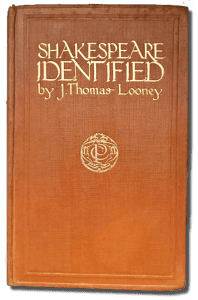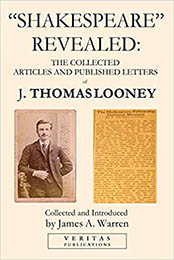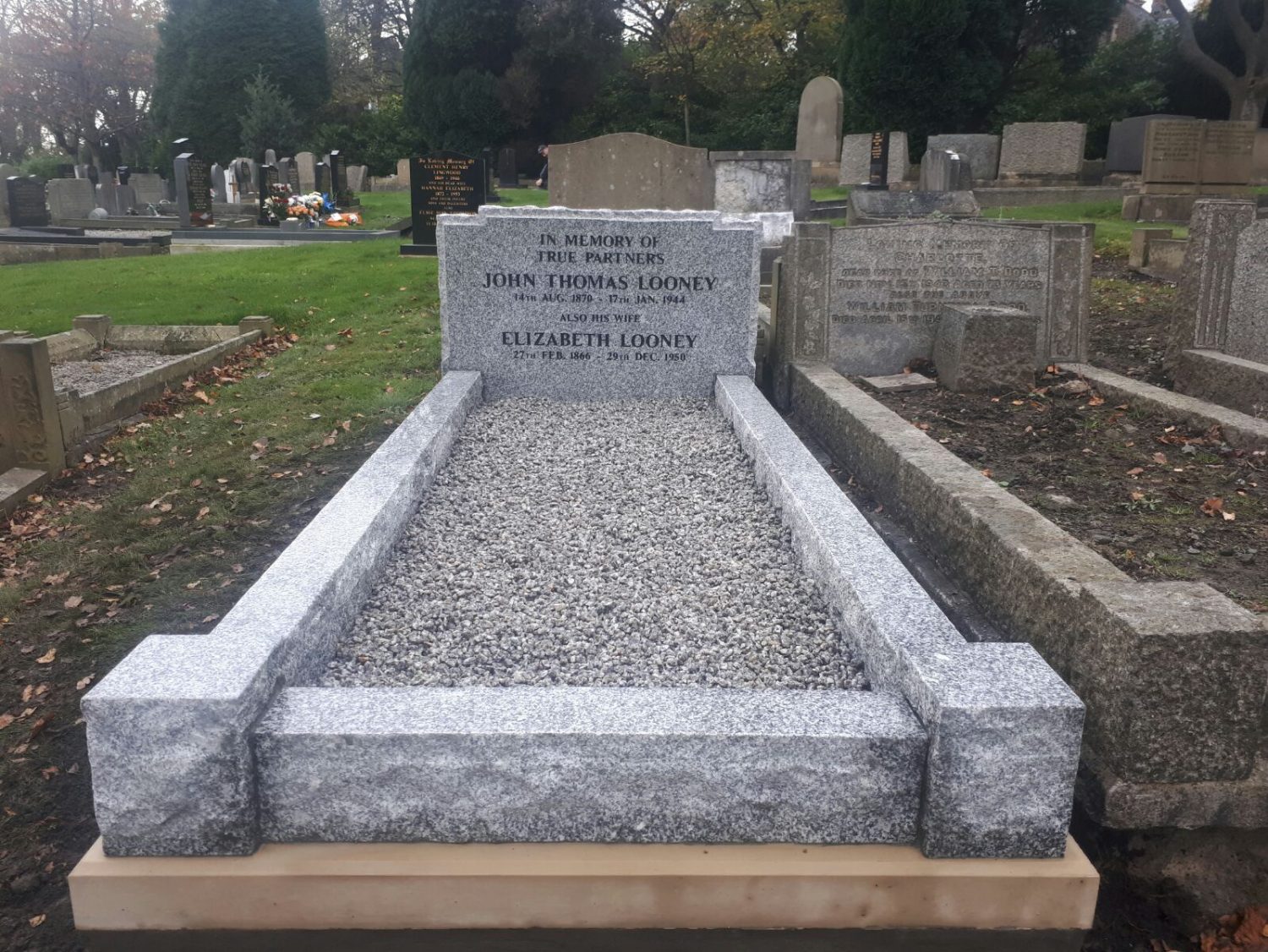"SHAKESPEARE" IDENTIFIED
CENTENNIAL
100 years of the book that unmasked Shakespeare
How did the modern world discover the writer behind the pen name “Shakespeare”?
It all began with a revolutionary book published on March 4, 1920, by a British scholar named J. Thomas Looney. He marshaled a vast array of circumstantial evidence to launch the Oxfordian theory. The publication of his book, “Shakespeare” Identified, laid the foundation to credit Edward de Vere, 17th Earl of Oxford, as the true author of the works of Shakespeare.
In 2020, the Shakespeare Oxford Fellowship celebrated the centennial of this book that changed our understanding of the author, the works, the Elizabethan era, literary creativity, and Shakespeare studies. We also celebrated the 150th anniversary of J. Thomas Looney’s birth.
A REVOLUTIONARY DISCOVERY
In 1920, Looney published “Shakespeare” Identified. He was puzzled by the implausible traditional story: that a man of limited education who never traveled abroad, whose many surviving personal records betray no hint of literary interest, somehow wrote works infused with deep learning, cosmopolitan life experiences, and exposure to cultures outside England (notably Italy).
Approaching the mystery like a criminal detective, Looney sought to discover the writer behind the pseudonym “William Shakespeare” by deriving a profile of the author’s characteristics. He combed through scholarly sources and found a poem written by Edward de Vere (Earl of Oxford) that sounded like the writing of Shakespeare. He discovered that Oxford was highly praised by his contemporaries as a poet and playwright, yet most works connected to his name were missing. The detective had identified his suspect.
“Shakespeare” Identified remains the most revolutionary book on Shakespeare ever written. Since its publication, generations of scholars have deepened and extended JTL’s findings, substantiating his conclusion that Oxford was the author of the plays and poems widely regarded as the greatest in the English language.
The Centenary Edition edited by James A. Warren features a new layout, a bibliography, and identifies the sources of more than 230 quoted passages.
Once the readers of 'Shakespeare' have the career and personality of the Earl of Oxford in their minds, they will find our great masterpieces pulsating with a new and living interest.
JOHN THOMAS LOONEY
A HIDDEN WRITER, UNMASKED
Looney’s analysis focused initially on Shakespeare’s poem Venus and Adonis (1593). He searched among little-known poets of the era and found a poem with a similar rhyme scheme, subject, and style. It was by Edward de Vere, Earl of Oxford. He researched Oxford’s life and discovered a highly educated courtier poet, praised for his comedies, who generously supported writers and acting companies and embodied all the characteristics Looney identified in his profile of the author.
Oxford’s known biography, travels, and temperament match closely the works of Shakespeare. Born into an aristocratic family, young Edward was tutored by Sir Thomas Smith, a scholar of law and the classics. Orphaned at age 12, he became a ward of Queen Elizabeth and moved to the home of one of her top advisors, William Cecil (Lord Burghley), where he was taught by Laurence Nowell of Beowulf fame, by his uncle Arthur Golding (translator of Ovid), and had access to one of the best private libraries in England. In his teens and twenties, he wrote songs and poetry with themes, language, imagery, and techniques echoed hundreds of times in the mature “Shakespeare” canon.
“Oxford is a first-class poet, nearly the whole of whose poems are missing; ‘Shakespeare’s’ poems are first-class verses whose author is missing…. What, then, are the probabilities that Oxford is the missing author of the ‘Shakespeare’ plays; that the ‘Shakespeare’ plays are Oxford’s ‘lost’ dramas; that the two outstanding mysteries of Elizabethan drama have a common solution?”
— J. Thomas Looney
A CENTURY OF "SHAKESPEARE" IDENTIFIED




JOHN THOMAS LOONEY,
LITERARY DETECTIVE
John Thomas Looney (14 August 1870 – 17 January 1944) was a determined scholarly detective and brilliantly original thinker. He gained familiarity with the works of Shakespeare while teaching them to his students as a schoolmaster in Gateshead, England.
JTL’s logical, fact-based method sets him apart from some who have explored the authorship question. A modest man, he persevered despite ridicule heaped upon him for daring to challenge traditional assumptions. Among many admirers of his book was Sigmund Freud, who read it in 1923 and remained a lifelong Oxfordian.
Looney’s critics have mostly avoided the difficult challenge of rebutting the merits of his arguments. Instead, they have often resorted to ad hominem cheap shots and innuendo. An open-minded rationalist, he questioned traditional beliefs in various ways. Yet he has been falsely smeared as a cultist, a snob, or a reactionary. His family name, originating on the Isle of Man, has been an all-too-easy target. It is an anglicized form of the Gaelic “O’Luanaigh,” a name derived from “luan” meaning “warrior.”
The reality is that Looney’s book is a thoughtful, persuasive, and gracefully written watershed in literary history. Already influential, it merits much wider recognition and readership.
I no longer believe that … the actor from Stratford was the author of the works that have been ascribed to him. Since reading "Shakespeare" Identified by J. Thomas Looney, I am almost convinced that the assumed name conceals the personality of Edward de Vere, Earl of Oxford…. The man of Stratford seems to have nothing at all to justify his claim, whereas Oxford has almost everything.
SIGMUND FREUD
FORENSIC PROFILE OF THE AUTHOR "SHAKESPEARE"
Looney examined the writings of Shakespeare to identify the type of education, background, and character of the person who wrote the works. He identified the following characteristics:
- A matured man of recognized genius
- Apparently eccentric and mysterious
- Of intense sensibility — a man apart
- Unconventional
- Not adequately appreciated
- Of pronounced and known literary tastes
- An enthusiast in the world of drama
- A lyric poet of recognized talent
- Of superior education – classical – the habitual associate of educated people
- A man with feudal connections
- A member of the higher aristocracy
- Connected with Lancastrian supporters
- An enthusiast for Italy
- A follower of sport (including falconry)
- A lover of music
- Loose and improvident in money matters
- Doubtful and somewhat conflicting in his attitude to women
- Of probable Catholic leanings, but touched with skepticism

FACES OF THE CENTENNIAL
In addition to the National Press Club symposium in Washington, D.C., on March 4, the Centennial Committee launched a campaign of local actions, inviting people to pay tribute to J. Thomas Looney in whatever way they chose. Pledges came in from all across the United States, and even a few from Europe, to carry out a local Centennial act some time during the year. Learn more and see all the Faces of the Centennial here!
AN UNKNOWN FIGHTER
Jim Warren, editor of the Centenary edition of “Shakespeare” Identified, has discovered letters from Looney to editors of publications that had run reviews critical of his book, revealing Looney to have been intensely engaged in defending himself and his ideas from attacks, and in further substantiating the validity of the Oxfordian claim. It is now apparent that J. Thomas Looney was a fighter—mild mannered on the outside, perhaps, but with a spine of steel inside. This video describes how he defended the Oxfordian claim, newspaper by newspaper, journal by journal, during its difficult first year.
CENTENNIAL COMMITTEE
About the Committee
Starting in 2014, the SOF President and Board of Trustees appointed and supported the Centennial Committee (also known as the "SI-100" Committee) to coordinate and promote our celebrations of JTL’s landmark achievement. The committee was originally chaired by Linda Theil, then for several years by Kathryn Sharpe, next by Bryan H. Wildenthal (Oct. 2019–March 2020), and finally by Linda Bullard (March–Dec. 2020).
J. Thomas Looney Research Project
James A. Warren has continued to work on researching and organizing letters and materials on the impact of “Shakespeare” Identified on Shakespeare studies and the wider literary world. His book on this subject, Shakespeare Revolutionized: The First Hundred Years of J. Thomas Looney's “Shakespeare” Identified, is available on Amazon and more works are coming soon.
Looney Grave Marker
Looney Grave Marker When the Centennial Committee learned in 2017 that J. Thomas Looney was buried in an unmarked grave, committee chair Kathryn Sharpe and SOF President Tom Regnier worked successfully with Looney’s heirs to place a headstone on his grave in Saltwell Cemetery, Gateshead, England. The SOF, along with England’s De Vere Society, helped fund the project by raising over $4,000 toward the purchase and installation of the memorial. The Looney memorial was completed in November 2017 by Joseph Richmond and Son Memorials of Newcastle-upon-Tyne, England.



